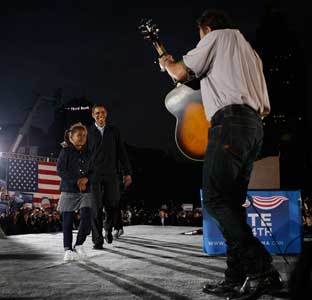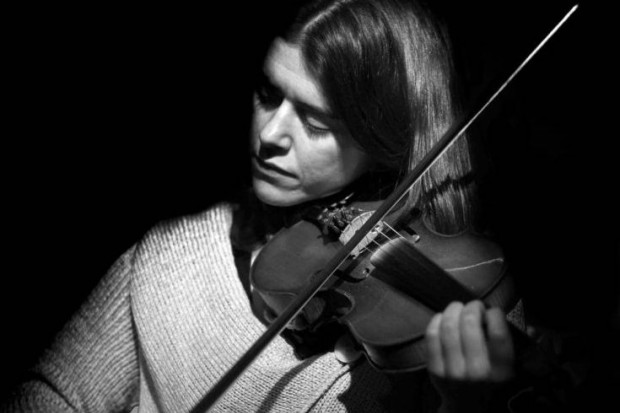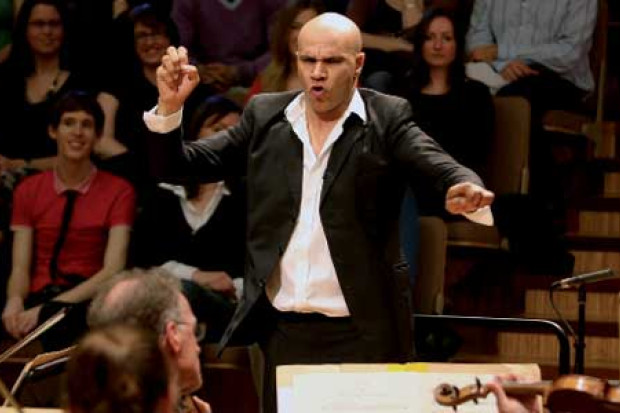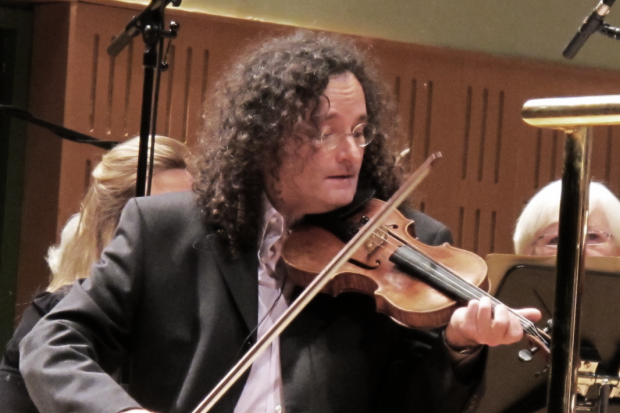
Obama Music
It’s difficult to warm to a book that at its heart is possessed by the queasiest of syllogisms. It goes like this: the blues is cool, Obama is cool, therefore Obama is the blues. But this is just the start: is gospel, is soul, is jazz soon follow in this meandering journey through the musical heritage of Chicago’s South Side, where the author grew up and where the Obamas still maintain their family home. On the face of it, Bonnie Greer’s Obama Music – Some Notes from a South Sider Abroad is an evangelical, hagiographical treatise on the ‘last great man of the West’; the man who has delivered on decades of black American struggle. And in order to get to the essence of this man – the man who transcends history itself – a metaphor is needed that projects beyond politics and the everyday and promotes something altogether more numinous: black American music becomes the vehicle.
The logic is weak, and intensely irritating, but this is not the worst fault of the book. For Obama Music isn’t biography (there isn’t enough research to elevate it onto that level) but autobiography and very quickly the reader begins to realise that that music – which is the feel, the vibe, the essence of Chicago South Side – is simply Greer Music. Yes, a London based journalist and playwright has decided to push her memoirs by putting the name and the face of the most famous man in the world on the front cover of her book. And this comes from the writer who as recently as April 2008 said in response to a positive appraisal of Obama by Alice Walker:
To call Barack… ‘our King, our Mandela’ is to absurdly give to a current figure the same weight accorded to the truly time- and struggle-tested greats. It is also one of the sure signs that hokum is alive and well in even the most exalted of literary circles… Walker writes that Obama presents ‘a rare opportunity for the country and the world to do better’. Well, damn, you don’t vote for somebody like that. You sanctify him.
Greer has come a long way since April 2008 and sanctification comes easily to an observer who so obviously missed the point the first time round. Here, talking about Obama’s own autobiography, we see consecration in action:
The whole of Dreams From My Father is Barack Obama’s attempt to assemble himself from the pieces left behind by his dad.
He is like an Osiris, the great Egyptian god who was dismembered and scattered around the world.
In a sense, Obama is his own Isis, the goddess who, in Egyptian myth, went through the world collecting the bits and pieces of Osiris.
Obama makes himself whole again.
Greer, needless to say, has never met the Obamas. But this does not inhibit the mateyness of the book. Of Michelle she says, having seen her on TV fussing over her daughter’s hair before a public engagement: ‘This woman, her family, I know them.’
And then, this sad, purely voyeuristic and unrequited love affair reaches the state of pathological jealousy – jealousy! – as Greer recounts an occasion in which she’s lunching with a friend in Paris. They are joined by her friend’s husband:
Anyway, my acquaintance’s husband is some big finance guy, some Master of the Universe, but all he can do is chatter like some school girl about… Barack Obama. He has a friend who’s quit his job to devote himself full time to following Obama around.
As he sits down, something comes over his Blackberry from his friend – another Obamagram, another missive from the trail.
Of the music itself there is little that hasn’t been lifted from dictionaries and when Greer does venture a musicological analysis she falls hopelessly adrift: ‘It becomes clearer and clearer to me as time passes that jazz and soul are hybrids’ she says in one of her brave attempts at de-bunking the myths that we have all sadly been bound to throughout our listening lives. Obama Music also resorts to the lowest form of writing about music (not seen in such glorious abundance since Paul Morley’s 2004 Words and Music): the list. Greer remembers her father’s record collection:
I can recall the 45s and 78s … the names of the musicians are like the list that Shakespeare gives Henry V to recite in that rousing St Crispin Day speech: Big Walter; Howlin’ Wolf; Magic Sam – King Of West Side Blues… [etc.]
But the list, with its lazy entreaty, fits snuggly into this book of one-sentence paragraphs, and tacky solecisms: ‘Living abroad, being an expat,’ says Greer in her preface ‘[means]… you use old-fashioned, maybe even “incorrect” words and ways of looking at things because they better describe how you feel, what you mean.’
Uncovering what Greer means is difficult. There are some shocking anecdotes of segregation in the US during the 50s and 60s and race remains a hot topic in the country, despite Obama. But the issue of race falls very easily away from this book and the reader is left with an altogether more mundane problem – middle-class guilt.
Greer is at pains to highlight her ‘regular’ beginnings, but a move through law and theatre schools, through Paris and London as a journalist and playwright, TV commentator and, more recently, Deputy Chair of the British Museum, has taken its toll on the integrity of the South Sider.
With a tear no doubt precariously positioned on her cheekbone, Greer recounts the moment she lost touch with her roots, when, as a youngster the ‘avant-garde’ music of Chicago loved by the ‘regulars’ (be-bop and hard-bop) was momentarily eclipsed by the sound on the radio of Phil Spector and the Beatles. Greer’s inner conservative shows itself on many occasions, most tellingly as she ponders the presidential election of 2008, and a depressingly English type of inertia finally shows itself:
They wanted change.
But the cruelest of our deceptions is that we believe that we want change.
We don’t.
Not really.
Just an adjustment here and there.
A bit of shifting of the scenery. New characters on the stage.
But change?
No.
Not really.
Perhaps Greer’s ecstatic essay about the Obama way, the Obama music, is merely a protective shield. Greer feels threatened by Obama. A black man, from a broken home, from Hawaii no less, passes through private schooling and the top universities in the land to become the leader of the free world – by the age of 47! This simply won’t do, the reader hears, screaming from between the lines. How does it make the rest of us – who have actually struggled to achieve in the face of discrimination – how does it make us look?
And this leads to the most unsettling aspect of this book, the dark underbelly, hopefully unconscious, that yearns for a disaster to prove that the years of fulfillment through identity politics have not been wrong; that in the continual referencing of the tree and the noose – where all honorable black men could, throughout history, have met their fate – we can find a certainty that will extinguish the waking dream that is President Obama.
The journey of Obama Music is now complete. The 44th President of the United States of America, barely ten months into his administration, is doubted and then accepted, supported and then revered, crowned and then martyred in the space of 284 pages of jottings by a simple working class regular from the South Side of Chicago. As the author chillingly states on the final page: ‘The People giveth. And the People taketh away.’
–
Obama Music: Some Notes from a South Sider Abroad by Bonnie Greer is published by Legend Press
Published on 1 December 2009
Peter Rosser (1970–2014) was a composer, writer and music lecturer. He was born in London and moved to Belfast in 1990, where he studied composition at the University of Ulster and was awarded a DPhil in 1997. His music has been performed at the Spitalfields Festival in London, the Belfast Festival at Queen’s and by the Crash Ensemble in Dublin. In 2011 the Arts Council acknowledged his contribution to the arts in Northern Ireland through a Major Individual Artist Award. He used this award to write his Second String Quartet, which was premiered in 2012 by the JACK Quartet at the opening concert at Belfast's new Metropolitan Arts Centre (The MAC). Peter Rosser also wrote extensively on a wide range of music genres, with essays published in The Journal of Music, The Wire, Perspectives of New Music and the Crescent Journal. He died following an illness on 24 November 2014, aged 44.

















